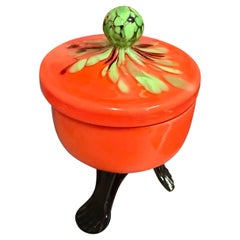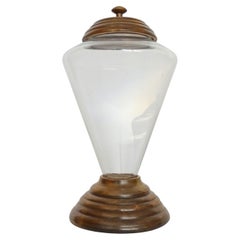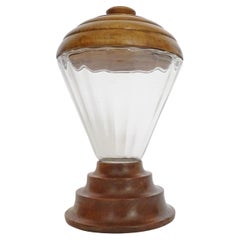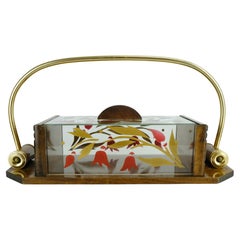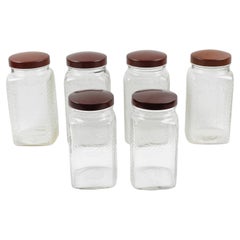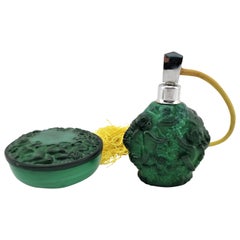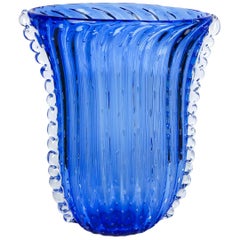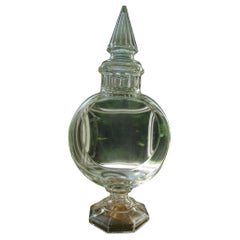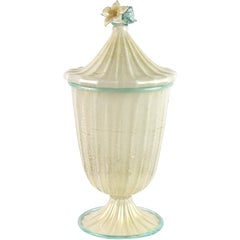Art Deco Glass Jar
Early 20th Century Czech Art Deco Jars
Art Glass, Paint
Vintage 1930s Italian Art Deco Jars
Glass, Wood
Vintage 1930s Italian Art Deco Jars
Glass, Wood
Vintage 1930s French Art Deco Jars
Brass
Vintage 1930s French Art Deco Jars
Glass, Bakelite
Early 20th Century Austrian Art Deco Jars
Metal
21st Century and Contemporary Italian Art Deco Jars
Gold Leaf
Early 20th Century Art Deco Jars
Glass
Mid-20th Century Italian Art Deco Jars
Gold Leaf
Early 20th Century French Art Deco Jars
Crystal, Enamel, Metal, Zinc, Copper, Brass
Early 20th Century European Art Deco Jars
Glass
21st Century and Contemporary Italian Art Deco Jars
Gold Leaf
21st Century and Contemporary Italian Art Deco Jars
Gold Leaf
Early 20th Century Italian Art Deco Glass
Aluminum
Vintage 1930s French Art Deco Glass
Art Glass
Vintage 1930s Italian Art Deco Jars
Murano Glass
20th Century European Art Deco Jars
Glass, Art Glass
Mid-20th Century European Art Deco Tableware
Silver Plate
Vintage 1970s Belgian Jars
Art Glass
Early 20th Century Czech Art Deco Jars
Glass
Vintage 1930s German Art Deco Jars
Glass
Vintage 1920s French Art Deco Glass
Gold
Early 20th Century European Art Deco Jars
Amethyst
Vintage 1920s American Sterling Silver
Sterling Silver
20th Century American Art Deco Barware
Aluminum
Vintage 1920s American Art Deco Sterling Silver
Crystal, Enamel, Sterling Silver
21st Century and Contemporary Portuguese Art Deco Jars
Crystal, Onyx, Marble, Gold Leaf, Metal, Brass, Copper, Stainless Steel,...
Early 20th Century English Art Deco Barware
Silver Plate
Mid-20th Century Chinese Art Deco Ceramics
Ceramic
Vintage 1920s English Art Deco Sterling Silver
Crystal, Sterling Silver, Enamel
Vintage 1930s American Art Deco Platters and Serveware
Gold, Sterling Silver
Vintage 1920s Danish Art Deco Porcelain
Porcelain
20th Century English Art Deco Jars
Glass, Art Glass, Blown Glass
Late 20th Century Italian Art Deco Barware
Bronze, Stainless Steel
Vintage 1970s Swedish Art Deco Sterling Silver
Silver, Sterling Silver
Vintage 1930s Italian Art Deco Platters and Serveware
Ceramic
Vintage 1930s Swedish Art Deco Ceramics
Earthenware
Early 20th Century Art Deco Jars
Crystal, Brass
Early 20th Century German Art Deco Dinner Plates
Earthenware
Early 20th Century German Art Deco Serving Pieces
Earthenware
Antique Late 19th Century French Art Deco Ceramics
Silver
Vintage 1920s French Art Deco Ceramics
Ceramic
Vintage 1930s French Art Deco Glass
Glass
Vintage 1920s French Art Deco Glass
Art Glass
Vintage 1930s Italian Art Deco Glass
Murano Glass
Vintage 1920s French Art Deco Glass
Art Glass
Vintage 1920s Danish Art Deco Tableware
Antique Late 19th Century Spanish Art Deco Sterling Silver
Gold Plate, Silver, Sterling Silver
Vintage 1930s Italian Art Deco Glass
Murano Glass
Vintage 1920s Czech Art Deco Barware
Crystal
Vintage 1930s Danish Art Deco Decorative Boxes
Metal
Vintage 1930s Art Deco Ceramics
Brass
Vintage 1970s Portuguese Art Deco Ceramics
Stoneware
Mid-20th Century Swedish Mid-Century Modern Vases
Art Glass
Vintage 1910s French Art Deco Serving Pieces
Crystal, Silver Plate
Vintage 1920s American Mid-Century Modern Jewelry Boxes
Art Glass
20th Century French Art Deco Bottles
Brass
Vintage 1940s Danish Art Deco More Dining and Entertaining
Ceramic
Vintage 1930s French Art Deco Decorative Boxes
Metal, Chrome
Vintage 1940s Argentine Art Deco Decorative Boxes
Blown Glass
- 1
Art Deco Glass Jar For Sale on 1stDibs
How Much is a Art Deco Glass Jar?
A Close Look at Art-deco Furniture
Art Deco furniture is characterized by its celebration of modern life. More than its emphasis on natural wood grains and focus on traditional craftsmanship, vintage Art Deco dining chairs, tables, desks, cabinets and other furniture — which typically refers to pieces produced during the 1920s and 1930s — is an ode to the glamour of the “Roaring Twenties.”
ORIGINS OF ART DECO FURNITURE DESIGN
- Emerged in the 1920s
- Flourished while the popularity of Art Nouveau declined
- Term derives from 1925’s Exposition Internationale des Arts Décoratifs et Industriels Modernes (International Exhibition of Modern Decorative and Industrial Arts) in Paris, France
- Informed by Ancient Egypt, Cubism, Futurism, Louis XVI, De Stijl, modernism and the Vienna Secession; influenced Streamline Moderne and mid-century modernism
CHARACTERISTICS OF ART DECO FURNITURE DESIGN
- Bold geometric lines and forms, floral motifs
- Use of expensive materials such as shagreen or marble as well as exotic woods such as mahogany, ebony and zebra wood
- Metal accents, shimmering mirrored finishes
- Embellishments made from exotic animal hides, inlays of mother-of-pearl or ivory
ART DECO FURNITURE DESIGNERS TO KNOW
VINTAGE ART DECO FURNITURE ON 1STDIBS
Few design styles are as universally recognized and appreciated as Art Deco. The term alone conjures visions of the Roaring Twenties, Machine Age metropolises, vast ocean liners, sleek typography and Prohibition-era hedonism. The iconic movement made an indelible mark on all fields of design throughout the 1920s and ’30s, celebrating society’s growing industrialization with refined elegance and stunning craftsmanship.
Widely known designers associated with the Art Deco style include Émile-Jacques Ruhlmann, Eileen Gray, Maurice Dufrêne, Paul Follot and Jules Leleu.
The term Art Deco derives from the name of a large decorative arts exhibition held in Paris in 1925. “Art Deco design” is often used broadly, to describe the work of creators in associated or ancillary styles. This is particularly true of American Art Deco, which is also called Streamline Moderne or Machine Age design. (Streamline Moderne, sometimes known as Art Moderne, was a phenomenon largely of the 1930s, post–Art Nouveau.)
Art Deco textile designers employed dazzling floral motifs and vivid colors, and while Art Deco furniture makers respected the dark woods and modern metals with which they worked, they frequently incorporated decorative embellishments such as exotic animal hides as well as veneers in their seating, case pieces, living room sets and bedroom furniture.
From mother-of-pearl inlaid vitrines to chrome aviator chairs, bold and inventive works in the Art Deco style include chaise longues (also known as chaise lounges) and curved armchairs. Today, the style is still favored by interior designers looking to infuse a home with an air of luxury and sophistication.
The vintage Art Deco furniture for sale on 1stDibs includes dressers, coffee tables, decorative objects and more.
- 1stDibs ExpertApril 5, 2022Yes, stained glass windows are indeed Art Deco. Between the 1920s and 1950s, color was an integral part of the movement, and stained glass, with its gorgeous hues, was highly celebrated. Find an assortment of stained glass windows from some of the world’s top sellers on 1stDibs.
Read More
This Onyx, Diamond and Sapphire Ring Is an Art Deco Stunner
The exquisite French jewel feels as modern today as when it was created, nearly a century ago.
Eileen Gray’s Famed Cliffside Villa in the South of France Is Returned to Its Modernist Glory
After years of diligent restoration, E-1027, the designer-cum-architect’s marriage of romance and modernism, is finally complete.
A 1920s Art Deco Necklace with a Stunning Drop Emerald
The cabochon gem centerpiece and diamond-set elliptical rings makes it a marvel of Gatsby-era glamour.
Cartier: The Jeweler Who Helped Define Art Deco
Cartier created some of the most iconic jewelry designs that defined this era.
Our Guide to Victorian, Edwardian and Art Deco Engagement Rings
Learn about these antique jewelry styles, then choose a design that speaks to you.
Why Vintage Watches Are Making a Comeback
Men, women and the watchmakers themselves are falling for the old-fashioned charm of retro timepieces.
The Process: 5 Creators of Chic Customizable Lighting
Bespoke lighting is a hallmark of upscale interiors, and contemporary makers are increasingly ambitious in their materials and forms.
An Incomparable Trove of Art Deco Treasures Is on View in Miami Beach
Heading to Florida for the art and design fairs in early December? Make time on your schedule to visit a newly opened exhibition that examines the movement's migration from Europe to America, and its evolution from niche to universal appeal.
